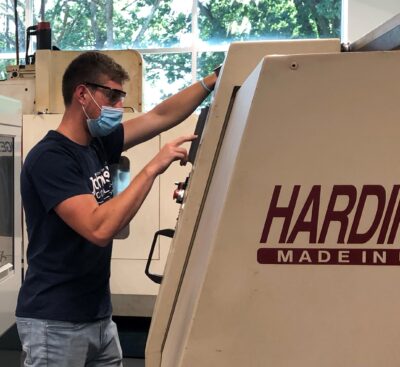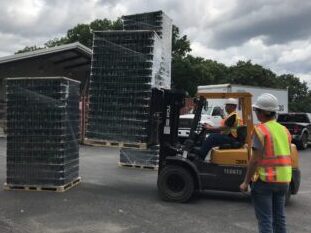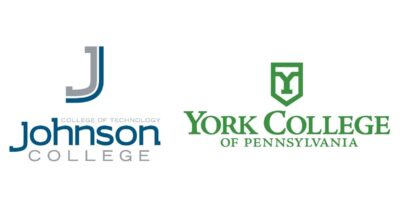By Kimberly Konopka, BS, AS, CVT, ESMT, Program Director of the Veterinary Nursing Program at Johnson College
Originally published in the February 25, 2022 edition of the Valley Advantage.
We brush our teeth, floss, and gargle mouthwash every day to keep our teeth and mouth healthy. What about your pets’ dental care? Is it as essential to their overall health as it is ours? Those are the types of questions we recently received and will try to answer.
“My veterinarian said that my pet needs a dental exam. Is this true?”
The simple answer is YES! Our pets’ mouths are very similar to our own and need attention as well. Food particles and bacteria cause a film to form known as plaque, which then hardens to form tartar.
This is that hard yellow- to brown-colored build-up you may notice on teeth, especially the back molars. Not only is it unsightly, but without proper attention, it may lead to other health concerns.
The bacteria can also invade the gums, causing pain and inflammation known as gingivitis, leading to periodontal disease and tooth loss. There is evidence that dental disease is associated with cardiopulmonary diseases such as endocarditis, inflammation of the liver and kidney disease. This stems from the bacteria entering the bloodstream and traveling to these vital organs. A procedure called dental prophylaxis,
done by a veterinary professional, assists in helping to keep all these issues at bay.
“My pet is only 5 years old. Can I wait until he/she is older to talk to my Vet about dental health?”
Don’t wait! Issues can start in a very young pet, and it’s not uncommon for them to arise at the age of 4-5 years. How do you know if your pet needs a dental exam? During their annual wellness exam, the veterinarian may notice an issue on the visual exam and recommend scheduling the procedure.
There are also signs that your pet may show before the vet visit, which may include:
Pain: Gingivitis and dental disease cause inflammation which is painful. Unfortunately, your pets cannot verbally express that they’re in pain, and often low levels of pain go unnoticed, or your pet becomes accustomed to it over time. If the pain becomes significant enough, your pet may stop eating. You may also notice a difference or reduction in your pet’s level of play or interaction. If the mouth hurts, it makes sense that they may not want to play fetch or tug.
Halitosis, or bad breath: As dental disease progresses, you may notice halitosis. It may become so overpowering that it can be detected from several feet away!
Loss of teeth: When the bacteria invade below the gum line, it can eat away at the support structure of the tooth. This abscess may form along the root of the tooth as well. When the support structures become weak enough, the tooth will become loose and potentially fall out.
“What should I expect to occur for a dental prophylactic procedure?”
It’s far more detailed than one may think. Unfortunately, your pet is unlike a human in this respect and not willing to sit back and open wide. There are several steps involved in the process.
Pre-anesthetic blood work: Your pet will need to go under general anesthesia to have a proper dental cleaning and evaluation of the oral cavity.
Pre-dental radiographs: Like their human counterpart, your pet will have dental radiographs to fully evaluate above and below the gum line giving the veterinarian a better image of the teeth, support structures and overall health of the mouth.
Ultrasonic scaling: This is performed utilizing the same equipment your dentist uses and helps remove the plaque and tartar on the tooth surface above the gum line.
Subgingival hand scaling: Plaque and tarter that lies below the gum line is removed utilizing special hand scaling instruments, the same procedure as you would receive at the dentist.
Extractions, if necessary: This procedure can be as simple as touching a loose tooth, so it pops out, or advanced enough that it requires drills, cutting wheels, flaps and sutures. Some of those teeth have three roots.
Polishing: Veterinary polishing paste is bubblegum flavored, too. A sleeping pet doesn’t care if it’s not beef-flavored. This step serves a purpose other than making the teeth look good. The polish is slightly abrasive, making the tooth have a very smooth surface removing microscopic divots where the bacteria can cling onto, which starts the entire process over again.
Recovery: Once complete, your pet will be moved to a recovery location and closely monitored until discharge. Your veterinary staff will inform you of post-anesthesia/post dental care.
At-home dental care is easy to do and doesn’t require much time or many products. All you need to get started are pet toothpaste, which is necessary because human toothpaste is toxic to pets, and a pet toothbrush. You’re ready to go!









